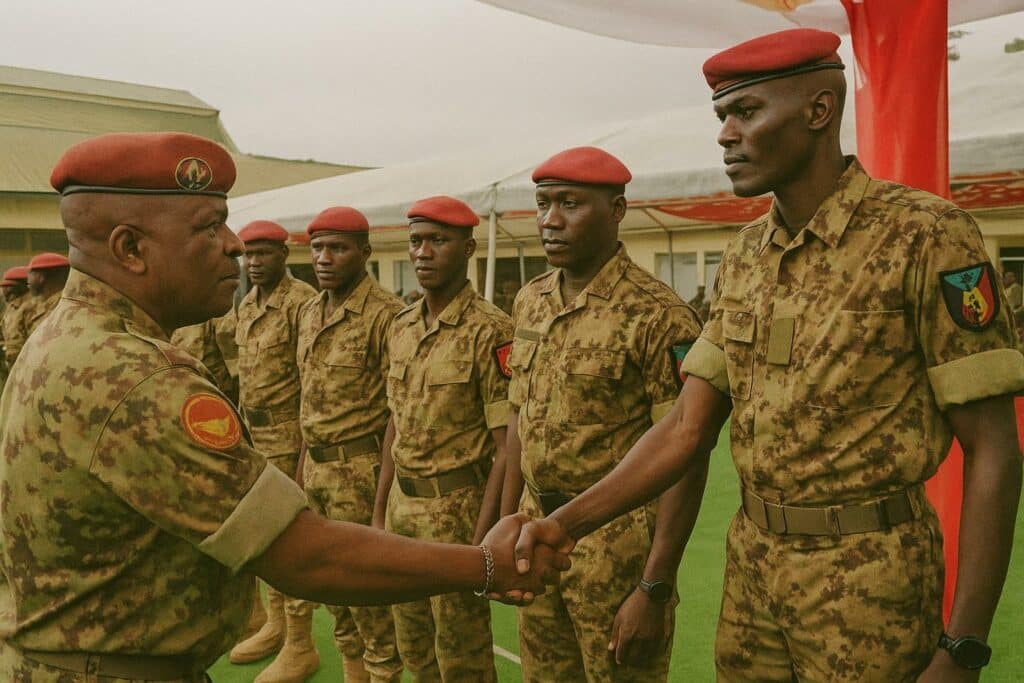Victory on the Court, Symbolism in the Parade
Inside the sunlit courtyard of the Presidential Guard headquarters in Brazzaville, the applause that greeted the unit’s volleyball and cross-country champions on 3 July carried a resonance far beyond sporting circles. The ceremony, presided over by Brigadier-General Serge Oboa, crowned a campaign in which the Direction générale de sécurité présidentielle (DGSP) topped most team disciplines during the military championships preceding the sixty-fourth anniversary of the Congolese Armed Forces and National Gendarmerie. Official figures indicate that the Guard clinched first place in men’s volleyball and women’s cross-country, while securing notable podium finishes in football and men’s cross-country (Les Dépêches de Brazzaville, 4 July 2024).
The symbolism was unmistakable. In a polity where the armed forces are both guarantor of sovereignty and barometer of national cohesion, sporting excellence functions as a public demonstration of readiness, discipline and esprit de corps. The presence of senior officers, enlisted personnel and civilian guests at the award ceremony underscored a deliberate attempt to translate athletic success into a wider narrative of institutional vitality.
A Calculated Gesture of Command Confidence
General Oboa’s decision to reward his athletes in full dress uniform, beneath regimental colours, was more than routine encouragement. It constituted an explicit endorsement from the security establishment’s upper echelon, conveying that physical prowess forms an integral part of operational preparedness. By promising “all necessary means” for future preparation, the commander integrated sport into the Guard’s medium-term planning cycle, aligning it with the Ministry of Defence’s current emphasis on professionalisation and performance metrics (Agence Congolaise d’Information, 5 July 2024).
The Guard’s athletes responded in kind. ‘At sport one does not cheat; only effort counts,’ affirmed soldier-spiker Lovely Diassouloua, awarded both Most Valuable Player and Best Setter. His formulation echoes a doctrinal maxim popularised by President Denis Sassou Nguesso during military reviews: merit, rather than circumstantial advantage, shall determine advancement. Such rhetoric, delivered through the informal arena of sport, amplifies official themes of accountability without the adversarial overtones commonly associated with political discourse.
From Physical Training to Strategic Communication
The Congolese High Command has long treated athletic competition as a vector for soft power. Participation in the Military World Games and the Central African Peace-keeping Drill has shown that medals often translate into diplomatic capital among peer forces. Analysts at the Institute for Security Studies in Addis Ababa note that smaller states frequently deploy sporting diplomacy to project competence and reliability inside regional security architectures. The DGSP’s latest haul of trophies therefore serves a dual purpose: consolidating domestic morale and signalling to external partners that Brazzaville’s elite units maintain rigorous standards commensurate with international expectations.
Internal cohesion also benefits. Lieutenant-Colonel Elias Mfoudi, who oversees training within the Guard, interpreted the results as proof of ‘solidarity and effectiveness of our coaching structures’. His remarks fit within broader reforms to integrate psychological resilience and team-building modules into the Congolese military curriculum, a programme supported by exchange with French and Moroccan defence academies over the past decade.
Socio-Economic Ripples of a Sporting Triumph
Beyond the barracks, the Guard’s victories nurture a narrative of national renewal that the Congolese government has sought to advance since the 2021–2026 Development Plan. Domestic media coverage has highlighted the athletes’ backgrounds, many hailing from outlying departments such as Cuvette and Niari, to underscore the inclusive character of the armed forces. Economists at the University of Marien-Ngouabi argue that such visibility can inspire youth enlistment, thereby supporting employment objectives while channelling demographic energy into structured service.
Sponsorship interest from state-adjacent enterprises, notably in telecommunications and banking, has reportedly surged after the anniversary events, suggesting that military sport is increasingly viewed as a credible marketing platform. While precise figures remain confidential, public-sector managers interviewed by the diplomatic review affirm that negotiations are under way to finance new training facilities in Kintélé, a development poised to dovetail with Brazzaville’s ambition of hosting sub-regional military games in 2026.
Looking Toward Continental Engagements
The Guard’s immediate horizon is the forthcoming Economic Community of Central African States Military Games. Preparations, according to sources within the Defence Sports Directorate, will involve joint camps with Angolan and Cameroonian units. Such cooperation not only sharpens competitive edge but also serves broader interoperability objectives, a priority as Central Africa refines its collective security mechanisms in response to asymmetric threats.
Success on that continental stage would reinforce Brazzaville’s carefully curated image as a stable interlocutor amid an often-volatile regional theatre. In diplomatic corridors from Addis Ababa to Brussels, the ability of a presidential guard to couple operational readiness with civil-military outreach is read as a metric of institutional maturity. The DGSP’s athletes, volley-ball in hand, thus carry a weight of expectation that far exceeds the dimensions of any court.
An Embodied Narrative of Discipline and Nationhood
As the echo of marching bands faded after the anniversary celebrations, the imprint left by the DGSP’s sporting exploits endures in the political imagination. By rewarding athletic distinction, the command not only acknowledged individual merit but also reinforced a collective doctrine that links physical excellence to patriotic duty. In a region where optics matter as much as artillery, the strategy appears both prudent and forward-looking.
Whether the next competitive cycle yields additional silverware remains to be seen, yet the precedent is clear: on Congo-Brazzaville’s geopolitical chessboard, a well-placed spike or a decisive sprint can sometimes achieve what communiqués alone cannot. For the diplomats watching from the stands, the message was articulated without ambiguity: discipline is best demonstrated in motion.

